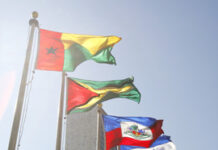Photo credit: DiasporaEngager (www.DiasporaEngager.com).
An international police operation of African and Caribbean officers is set to begin in Haiti to help local police overwhelmed by armed gangs. It’s a mission with a historic backstory, but this force may be inadequate to deal with the scale of the problem.
By Pierre Haski, France Inter —
It is one of the most dangerous missions in the history of peacekeeping forces. It’s not going to a country at war — not a conventional war in any case — but to Haiti, a territory that is partly in the hands of armed criminal gangs.
Any day now, 1,000 Kenyan police officers, followed by 2,000 Beninese and smaller contingents from Caribbean islands are expected in Port-au-Prince, under the aegis of the UN, to help the overwhelmed local police.
Even arriving in the Haitian capital isn’t easy: The international airport has been closed to commercial flights since February, gangs are blocking access to the port, and traffic access to Port-au-Prince is blocked by armed men.
Nevertheless, everything seems ready for this mission, which has been in preparation for months and which seems modest compared to the scale of the disaster. But the U.S. and Canada have declined the invitation to send troops, and are content to finance the operation: $300 million sent by the U.S. alone. Kenyan President William Ruto is expected in Washington tomorrow, in parallel with the deployment of his men.
State authority
U.S. military aircraft have made several high security flights in the past few days to deliver equipment for the future international police force. But there’s no question of the U.S. deploying personnel to the island, contrary to several episodes in previous decades.
The African and Caribbean police officers are reinforcing the small Haitian police force of a few thousand members, which is having a hard time surviving in the hell of the gangs, thousands of armed men who, with complete impunity, control around 80% of the city, killing, raping and robbing. The gangs continue to smuggle in contraband arms from Florida, despite a UN embargo that is difficult to enforce.
This has all the makings of an impossible mission.
The situation in Haiti suddenly deteriorated with the assassination of President Jovenel Moïse in July 2021. The contested prime minister who was acting as interim president, Ariel Henry, resigned on April 25. He was replaced by a nine-member transition council, which is supposed to organise elections. But to do that, control of the capital must be regained and security re-established.
It will also be necessary to re-establish the authority of a state that the UN’s expert on Haiti, William O’Neil, described during a recent visit to Paris as “phantom.”
Life against misfortune
Why Africa? Haiti occupies a special place in African imagination, as the first black republic in modern history, from 1804. Benin adds a special dimension to this. It shares a common culture with Haiti, that of the slaves deported from the Gulf of Guinea on the west coast of Africa; the rich culture of the Yoruba people, whose divinities survive on both sides of the Atlantic.
The idea of African police officers setting out to help their distant Caribbean cousins, who were once victims of slavery, is one that captures the imagination. But that’s no guarantee of success, as the challenge seems beyond their means. After several disastrous international interventions in Haiti’s history, this has all the makings of an impossible mission.
This weekend, I was at the Surprising Voyagers Festival in Saint Malo, in the west of France, where Lyonel Trouillot, one of Haiti’s great writers, was expected — but he was unable to leave Port-au-Prince.
The French daily Le Monde contacted him at home, and asked him what he was hearing and seeing. His answer was chilling: “The sound of bullets, dead bodies and debris in the street. People who have become specialists in resourcefulness, who are trying to live against misfortune.”
For the sake of the Haitians, we must hope that the African police officers will succeed, and that they too will not find themselves embroiled in the “misfortune” of which Trouillot speaks.
Source: France Inter
Feature image: A man walks past the body of a police officer killed amid ongoing gang violence in Port-au-Prince, Haiti, on 20 March 2024. Negotiations to form a transitional council to govern Haiti advanced on 20 March, as the United States airlifted more citizens to safety from gang violence that has plunged the impoverished country into chaos. (Clarens Siffroy / AFP)
Source of original article: The Institute of the Black World 21st Century (ibw21.org).
The content of this article does not necessarily reflect the views or opinion of Global Diaspora News (www.GlobalDiasporaNews.com).
To submit your press release: (https://www.GlobalDiasporaNews.com/pr).
To advertise on Global Diaspora News: (www.GlobalDiasporaNews.com/ads).
Sign up to Global Diaspora News newsletter (https://www.GlobalDiasporaNews.com/newsletter/) to start receiving updates and opportunities directly in your email inbox for free.































